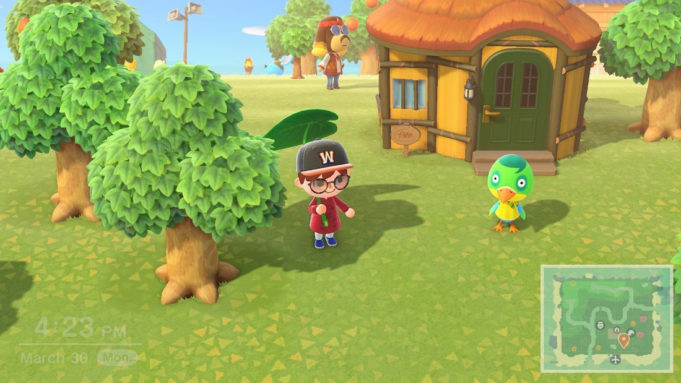Of the major games releasing in this time of self-isolation and quarantine, few could be as timely as Animal Crossing: New Horizons. The latest entry in Nintendo’s relaxing life-simulation series has all the laid-back gameplay people know and love while also bringing in much-needed tweaks and additions.
New Horizons, like all Animal Crossing games, has you making an unassuming avatar and moving to a town full of cute talking animals. There’s no world to save, just a life to live, each day providing new things to do as the in-game clock counts forward in real time, sunup to sundown. As in older titles, you’re free to wander your town, befriending your furry and scaly neighbors and pursuing pastimes like catching bugs, collecting fossils for the museum, and buying things to furnish your home with while also paying back local business owner and Realtor raccoon Tom Nook for your move by selling things like fish you catch or seashells you pick off the beach. Even after all these years, it’s still adorably chill, from the relaxed guitar background music to the kindness of your fellow islanders, the Switch’s graphical prowess making the animals fuzzier, the breeze gentler, and the vibe just even more relaxing.
What’s new to the series is that, instead of moving to an already established town, you and two random animals start on a deserted island. There are no houses and no shops, just roughing it in a tent or as rough as it gets in Animal Crossing. You can’t starve or freeze to death or anything, leaving you to collect sticks, stones, and other materials to craft tools like the shovels, axes, and fishing rods needed to turn your island from a weed-infested plot into a thriving village. In some ways, it feels like adding depth to the game by putting your starting point further back than in previous entries. However, with crafting comes customization, and being able to make your own home furnishings and paint them adds a deeper level of personalization. This goes even further, as you can now place furniture outside, allowing you to decorate the yard in front of your home, as well as select where buildings like the museum go when they’re available. Later on, you’re even able to change the island’s layout, moving rivers and raising or lowering land.
There are smaller quality-of-life changes as well. Character creation is simpler, and the game gives you a large storage space when you get a house and the ability to more easily rearrange furniture in it. But the best addition may be the new multiplayer mode. Not only does it give you the ability to visit other towns, but now you and other gamers living in your town can play local couch co-op, allowing you to run around, craft things, find fossils, and reduce debt at the same time, which is perfect for friends and families stuck inside.
It’s unlikely to change the minds of those who see its low stakes and casual nature as a bore, and it has some drawbacks –– only one village is allowed not per game cartridge but per Switch console. But New Horizons refines the already great Animal Crossing formula and, perhaps most relevantly, provides a refreshing simulation of going outside with friends.
Animal Crossing: New Horizons
Available for Nintendo Switch
Genre: Casual/Life Simulation
Rated E












